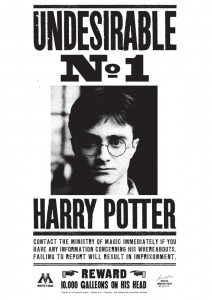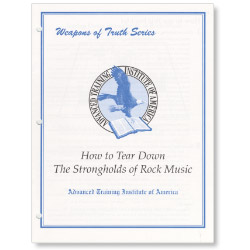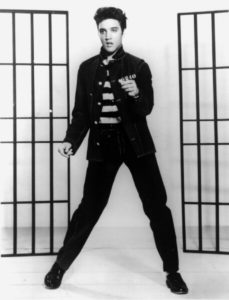‘Harry Potter’ and The Issues Beyond Fiction, Part 5
 A worst-case scenario: along with the fun, whimsical things like flying brooms, potions, and washing dishes by wand-work, the Harry Potter stories do show what pagans today would call “witchcraft.” And it’s not just the bad guys doing it. And it’s sinful practices that God does condemn in Scripture, either in the oft-cited Deuteronomy 18: 9-14 or elsewhere.
A worst-case scenario: along with the fun, whimsical things like flying brooms, potions, and washing dishes by wand-work, the Harry Potter stories do show what pagans today would call “witchcraft.” And it’s not just the bad guys doing it. And it’s sinful practices that God does condemn in Scripture, either in the oft-cited Deuteronomy 18: 9-14 or elsewhere.
My contention: Even then, Christians strong in their faith could read the series, enjoying the true parts, and not sin. I believe we find this shown plainly in Scripture.
Sure, we would need to be more careful. We wouldn’t abuse that freedom or strength to crow about how spiritually superior we are. Maybe we would not enjoy the material as much. And we would certainly not go on publicly theorizing how the author is actually a closet Christian who meant all along to proclaim Jesus (something we don’t need to prove anyway in order to justify Harry Potter or any other secular story!). But we still needn’t fear exposure to it.
In this series’ final column, I hope to show that how we discern Harry Potter affects how we do discernment in other ways, especially how we interact with other people …
10. Because the Bible itself shows saints serving God and staying holy, even while knowing and studying actual pagan things.
For Christians who feel they must somehow show Harry Potter is just as “Christian” a series as, say, The Chronicles of Narnia, but only its author hides it — I want to know: why do you feel we must prove that? And what happens when another popular and well-written series comes along that clearly isn’t made by Christians but has truth anyway? You’ve just bought into this assumption: that “a story must be clearly Christian or else get shunned.”
Scripture doesn’t share this assumption. In Old Testament saints, Daniel in particular, and among New Testament believers, especially Paul, we see Godly practice of holiness, along with culture-engagement and without fear of God’s-truth-opposing beliefs.
Yes, someone can abuse “engaging the culture” to excuse sinful motives and behavior. But still we find that Daniel, a strange man in a strange land, sought purity and holiness even while studying actual pagan witchcraft manuals in his secular advanced-education program. With God’s help, he outclassed fellow scholars and grew in the pagan king’s favor (Daniel 1). We see this also in the apostle Paul, the first specific missionary to the Gentiles. He not only didn’t fear Greek literature or culture, but read and quoted a pagan poem that accidentally contained a truth about God, though it was wrongly applied to the false god Zeus (Acts 17).
Neither of these cases took place in a local church, say, like playing a secular song to appeal to nonbelievers. We don’t read of Daniel trying to blend ecumenically some of the mystical beliefs with his prayer practices, or Paul endorsing all of the pagan poem while saying it was also from God. But neither of those men, in either Covenant, avoided even genuinely bad stuff. Instead they studied it — Daniel while staying personally holy and giving God the glory for it, and Paul to use as a conversation-starter outside a local church for non-Christians.
(For more, see the Imagination: for God’s glory and others’ good series, especially part 4.)
11. Because “someone else used it to sin” is not a Biblical reason to avoid something, and no one can practice that consistently anyway.
“There is not an ounce of doubt that the witchcraft societies, the sorcerer societies, have benefited from Harry Potter,” Wretched Radio host Todd Friel said on his June 10 program. “Call ‘em and ask ‘em.” That research is done and old, he added, and it’s incontrovertible.
Actually I haven’t the slightest thought to controvert it — because Christians don’t need to.
 “Pagans love the Harry Potter books.” That gets repeated often, and often without citation. But again, let’s assume that is correct. What does it prove? Other pagans say they don’t like being stereotyped as humans in robes who learn how to turn teacups into tabby cats or fly on brooms, all of which have nothing to do with actual pagan practices. (And if you will excuse a bit of snark, why are we listening to, and basing discernment on, what pagans say anyway?)
“Pagans love the Harry Potter books.” That gets repeated often, and often without citation. But again, let’s assume that is correct. What does it prove? Other pagans say they don’t like being stereotyped as humans in robes who learn how to turn teacups into tabby cats or fly on brooms, all of which have nothing to do with actual pagan practices. (And if you will excuse a bit of snark, why are we listening to, and basing discernment on, what pagans say anyway?)
So at best, that charge results in a stalemate: your Anecdotes versus my Anecdote. This is not only transparently silly — is the next move to count up Anecdotes to see who has the most and declare a winner? — but isn’t at all a Biblical method of deciding doctrine and practice.
What about the more-general argument that “someone else used it to sin”?
Author Randy Alcorn has written and hosted several balanced articles about Harry Potter, among them thoughts from a former occultist named Sarah Anne Sumpolec (Jan. 21, 2010):
I think Harry Potter is probably good clean fantasy fun for 99 percent of its readers. I’d be surprised if more than 1 percent went looking for the magical reality behind the fantasy. But then again, what is 1 percent of 500 million readers? How much of an impact is that?
That is indeed quite an impact, and I can understand Sumpolec’s concern — especially with her unique background. We should indeed be careful and seriously, yet winsomely, address the risks associated with any kind of art or fiction. Nothing is without potential of being abused for sin. But that is because humans are sinners. We’ll take anything and abuse it. Is that the Thing’s fault? No. If I wanted to get into real-life paganism, I’d use any excuse.
Ultimately “someone else used it to sin” is also an objection without Biblical basis. Moreover, if we tried to practice this same argument consistently, one could not read this column on the computer — someone else uses this same technology to gossip, look at porn, or waste time. One should avoid church — some elements of worship services may be borrowed from “pagans,” after all, and tainted! One might even want to reconsider the Bible itself — after all, many people have abused its truths to justify their own sin or even start cults. No one can practice this ethic consistently, and the Bible never levies this standard on us.
12. Because Christians should not base their discernment views only on the word of “weaker brothers” and sisters.
The “watch out for the weaker brother” argument is among the better objections to books like Harry Potter, or enjoying alcohol, big business earnings, or almost anything that could look “worldly.” For any Thing, be it book, song, or hobby, someone will be tempted to revert back to his tendency to abuse that thing for a sin — the real definition of “weaker brothers.” That’s a discussion Christians do need to have, along with rightful cautions against legalism.

"How to Tear Down The Strongholds of Rock Music." (Must be read in the voice of the old "Goofy" cartoon how-to narrator.)
However, the apostle Paul didn’t permit legitimate “weaker brothers” to set the agendas for everyone else. To the Corinthians he said that Christians who are stronger must be sensitive to conscience-tripping issues and abstain from even harmless activities if they hurt others. But that is far from looking to a new convert to set all doctrinal policy.
When I was younger I read a booklet we had lying about the house but never, to my memory, actually put into practice. (Its publisher was a ministry outfit called the Institute in Basic Life Principles, whose name sounds quite “Orwellian,” but unfairly so — it could be far worse.) Its title: “Ten Scriptural Reasons Why The ‘Rock Beat’ Is Evil in Any Form.” Its “evidence”: out-of-context Scripture and Anecdotes from people who it seems did abuse pop music and even “Christian contemporary” stuff for their own sin. And then there was this:
In April 1990, a Christian from Zimbabwe, Africa, arrived for his first visit to the United States. He is a native missionary under the Awana Youth Association. When he turned on a Christian radio station and listened to the music, he was shocked. Here is his report:
“I am very sensitive to the beat in music, because when I was a boy, I played the drums in our village worship rituals. The beat that I played on the drum was to get the demon spirits into the people. When I became a Christian, I rejected this kind of beat because I realized how damaging it was. When I turned on a Christian radio station in the United States, I was shocked. The same beat that I used to play to call up the evil spirits is in the music I heard on the Christian station.” (From this transcription.)
Now, how should a mature Christian, basing his discernment on the Bible, address this? One reply: “Lighten up, dude, it’s just a drum, and the Devil doesn’t work like that.” That takes his concern too casually. But the other extreme is followed here by this booklet’s writer: take it too seriously, as more true a Gospel result than what the Holy Spirit inspired the apostle Paul to say! Let’s all accept what our weaker brother, new in the faith, says about a Thing.
Neither response is Biblical. The former may occur more in a frivolity-obsessed evangelical culture. But the latter reaction may be worse because it actually accepts magical, mystical views as more true than Scripture itself, and in the name of “holiness.”
Isn’t this also like saying “he with the worst background gets to set the rules,” which treats a possible “weaker brother” as more discerning than faithful Christians who are more mature?
Paul’s advice to a new convert nervous about drum rhythms or fantasy books would surely be the same as his encouragement to the Corinthian church: for the sake of conscience, don’t enjoy that Thing when this beloved “weaker brother” is around. But I also highly doubt Paul asked that his letters be off-limits to the weaker brothers. So they would also read there that nothing is intrinsically evil about meat previously sacrificed to idols. The temple ceremonies offering them to idols were evil, but not the meat itself. And they need to grow in this.
Stronger brothers should be sensitive and loving. Yet weaker brothers also need to grow up. How that best happens is a topic for other books or articles. But let us not act as if “weaker brothers,” instead of Christians stronger in faith, have the final word on discernment.
13. Because we may accidentally base our “discernment” mainly on personal dislike or lack of enjoyment of certain kinds of things.
Are we sure we’re not basing views on our own dislikes, or simple lack of enjoyment, for some stories, and expecting other Christians to think the same?

Elvis has left the Evil building (perhaps due to the Biblical principle of Sanctification If It's Over Forty Years Old).
The day after the Wretched Radio program in which Friel dismissed Harry Potter as being without a clearly Christian “side,” he played a clip from an old Elvis song and mentioned that The Princess Bride is one of his favorite movies. Yet last I checked, neither the song nor the comedy/fantasy film mentions or honors Christ or His Church. In fact, both of them imagine (yes, even the song) a “world” in which God does not exist or isn’t a key Player!
So I must ask: how come the “rules” suddenly change when it comes to Harry Potter? How come some Christians say they expect only from that series a direct or allegorical inclusion of God or Christianity, or else reject it as evil and dangerous? Isn’t that a double standard? (Well, we haven’t seen hordes of people worshiping Elvis, or using him to sin or … oh wait.)
Here’s how the disparity just may arise: Elvis songs and The Princess Bride are older. Older stuff just happens to get away with more. Moreover, more people like old stuff — it’s their favorite Thing; it’s more acceptable among Christians to enjoy old stuff.
As for fantasy fiction — well, the quiet assumption exists that goes something like this: “why do you need that stuff at all? Better be safe than sorry. Scripture is sufficient anyway!” They naturally don’t think to apply the same ethics to, say, worship songs, or draperies, or fine cooking, or any other movie or genre or creative Thing they enjoy but don’t “need.”
But this ignores two vital details: first, this stuff is old anyway, thanks to the Patron Saints, Lewis and Tolkien! Second, many Christians have testified how much fantasy and visionary tales have helped them grow in Christ. Sure, many professing Christians go too far and equate the nonsense in, say, The Shack with actual truth from the all-sufficient Word — but that doesn’t make all fiction useless. Others can back up, with doctrine and practice, their claims that God has reminded them of Himself in secondary ways, like fantasy fiction.
All this applies to something like Twilight as well. Too bad. I dislike Twilight. By myself I can’t personally imagine why Christians would want to waste time with that series. We can ask those kinds of questions, and challenge others who we may believe aren’t making wise choices in their time or taking possible temptation sources seriously. But we should be consistent and not assume well, I know I wouldn’t enjoy it, so why does he/she “need” it?
14. Because we may forget that true Christians may hold different views of discernment, but still avoid worldliness and grow in grace.
 There’s a lot of good discernment-oriented material out there. And then there’s the stuff that pits super-externally-“holy” avoid-the-world-first types against, say, punk tattooed folks who claim they’re Christians mainly because they agree with the statement “Jesus loves you.”
There’s a lot of good discernment-oriented material out there. And then there’s the stuff that pits super-externally-“holy” avoid-the-world-first types against, say, punk tattooed folks who claim they’re Christians mainly because they agree with the statement “Jesus loves you.”
It’s an unfair, false dichotomy, and truly discerning Christians should beware reinforcing it. Example: I should not portray all Twilight fans as crazed middle-aged moms, who wish they were younger, cheering when young men remove their shirts to show their sparkling pecs onscreen. (Ugh.) Yes, those do exist. But others can enjoy those books for other reasons. And if I see them growing in love for Christ, resulting in their taking on His attributes thanks to the Holy Spirit changing them from within, it does not honor Him to judge their motives.
The same is true with Harry Potter. Or other fantasy stories. Or video games. Or fatty foods. Or music. Or alcohol. Or organs versus “praise teams.” … Anything that can be discerned.
Who would’ve thought a seven-book series about a boy wizard could help us learn so much?











































Oh, just cuz:
This is the part where it gets a bit odd for me. I suppose this has two possible answers (maybe more). From a writer’s perspective, I know firsthand what happens when you immerse yourself so deep into evil it’s hard to pull out (which is why I think there’s a definite need for anyone studying or writing those things even for benign purposes needs a ‘purging’ phase after). And trust me, it can take days, even weeks, to not feel dirty anymore. From a reader’s perspective, I suppose the same caution applies, but I also suppose to really be consistent you’d have to say the same thing with violence, gluttony, gossip, and a million other things that appear more palatable for whatever reason.
I’m not sure how the practical application for this works.
Maybe we would not enjoy the material as much.
So, I shouldn’t enjoy Harry Potter as much because some people find it distasteful? (I’m out of it today; maybe I misread.) I shouldn’t be a fan of Beauty & the Beast because some people boycott Disney (who promotes all kinds of things; and B&tB includes magic, chauvinism, and bestiality).
Well, it’s just a weak argument, and it won’t convince anyone who doesn’t already agree with you. If they’re in the closet, then how do you know?
Again, it’s a weak argument. Besides, now we’re headed into the secular/sacred divide.
You can’t legitimately appreciate it.
Complimentary counter-argument: Daniel was a POW put in chains and forced to march several hundred miles away and serve a brutal pagan king who would kill him if he refused. And Paul…was a book nerd.
I understand what you mean here, but I think you’re going to have to fight someone who’d say “If there’s no secular/sacred divide, and if the song itself is not inherently evil, then what’s the problem with playing a non-Christian song in church?” And some smart mouth (like me) is going to ask what you think about re-written bar songs.
But we don’t know that he didn’t, either.
Well, I’ll be a bit honest here: I fight a draw toward anything supernatural, myself. I admit there’s a couple times in the movies where I squirmed a bit, because there was either something evil going on, and I liked it, or there was something going on I knew I’d never accept in any other setting. I only tolerated because I’d accepted the storyworld of Hogwarts. So I think some concern is legitimate here. Course, also to be fair, if I really wanted to immerse myself in paganism, it’s not where I’d start. I’d probably start with a couple favorites that people read in high school as required reading.
Did you read what happened with the bronze serpent and Aaron’s staff? Both had to be broken apart and destroyed because people had started worshiping it. They used it to sin, and the proper response was destruction.
On the drums: I’m calling that an individual response thing. I can see it being an issue if you’re trying to engage in corporate worship with someone who cannot worship to a drum. I mean, practically, you can’t make every Christian musician stop playing drums; but you can resolve it at the local level. I don’t think that scenario has a blanket answer (which is why I hate situationals anyway). But I think that becomes one you handle with a lot of prayer and discussion. And probably some good counseling & instruction for the newbie.
More simply, I think there’s a bit of a difference between an ex-witch reading about witchcraft and putting the amulet they used to cast spells and summon demons in their hands. Because, in all fairness, people did burn their magic books after converting.
Let’s not get me started on that rant….
Well, I say that about getting drunk, so…
Oh, and I finally saw Part 2.
When I started reading the Harry Potter series, I was an actual Pagan and edited/wrote a Pagan newsletter. From a Pagan perspective I thought the way JK Rowling depicted the subject of divination showed that she probably would have thought Paganism also was pretty silly.
But I kind of wonder why some people seem to think you can’t read a fantasy book unless it’s written by a conservative Biblical Christian, while I’ve never heard a call to boycott science fiction books because the author is not known to be a conservative Christian.
Science fiction uses imaginary future science, fantasy uses imaginary magic. Real Pagan theology (or atheist theology, or anti-Christian slurs) can be found in fiction of all genres. And quite frankly I think the Christian who reads fiction from authors of all religious perspectives is better equipped to share Christ with people from these perspective than one who feels compelled to boycott everything that is not created by a theologically correct Christian.
My objections to Harry Potter and Twilight is mostly #13, but I know it’s that type, so…
Another great post, Stephen. I have appreciated them a lot. I think Christians fear “non-Christian” things because they fear contamination. They feel “dirty” as Kaci noted in her post above.
But, to my mind at least, this reflects an Old Covenant way of thinking. In the Old Covenant the “dust of the earth” was cursed, and so any animal that was in direct contact with the “dust” was unclean. If you go back and pay attention to the clean/unclean laws in the OT you find that all the strange laws in terms of contact, it is the animals that have no barrier between them and the “dust” that are unclean. The clean animals have some sort of symbolic barrier between themselves and the cursed “dust.” There is, symbolically, mediation between them and the world, typifying Christ, who came in the NT and reversed the order.
If a clean person touched an unclean thing int he OT, the clean became unclean. In Christ, the flow is turned on its head; the woman with the unclean issue does not contaminate Jesus; his touch cleanses her. As we are in Christ, what we handle does not contaminate us. There is no reason to fear; that doesn’t mean turn off your brain, but it does mean we do not need to avoid things for fear of becoming unclean. So we can enjoy blatantly atheistic literature without fear. Phillip Pullman has got some gorgeous prose, I’ll tell you that.
You asked why some people insist on making the Potter books “Christian,” like Narnia. You suggest they are still falling under the “it has to be Christian” rule. Perhaps for some; but for myself (as one currently writing a book on that very subject) I can safely say that this is not the reason. Rather, it is more about our ability to recognize Christian work nowadays, and I’m not convinced the majority of evangelicals have this ability anymore. Numerous scholars, including renowned Inkling scholars, have examined the literature of the Potter books and concluded that they are being writing in the same tradition as Tolkien and Lewis in many, many departments. That’s one indication. Then there is the testimony of the author herself, who has frequently said the books were directly Christian in intention and planning. That’s a second indication. So it becomes more a matter of recognizing the Potter books as canonical Inkling status, solidly Christian to the core; not so much a way of appeasing the conscience so that one can enjoy them guilt-free.
I have trouble with comparing magical systems in fiction to any sort of real-world occultism – or Scriptural prohibitions. To me this misses totally the point of literature. No, it’s not just a story. Yes, literature is connected to this world and presents worldviews. We all know that. But literature, by it’s very nature, is not a depiction of the real world. It is a way of reflecting or imaging it by way of metaphor. Literature is a window back into this world, but the simple act of writing a story is to take a step removed from this world. Even shows like Buffy, which are much closer to real world witchcraft than Potter, is a step removed. Magic doesn’t really work; I don’t care how closely to the real world form you get to, it doesn’t work. Christ threw down the principalities and powers 2000 years ago on the cross. The idols went silent. The spells ceased to work. The temples were left vacant. Even this modern resurgence of interest in the Old Ways have recreated the old pagan religions in their own modern image. There is no form of religion that accurately reflects the Old Paganism. Most of it is invented, as this and this and this shows.
Demons are real, but there are so many ways to influence people in our own world without magic that they seem to ignore it for the most part. I know a Catholic priest, Father Herman, whose spiritual gift appears to be exorcism, and who was a missionary in India for many years. He gets referrals from the Vatican, and two or three people are sent to him by the RCC for examination for possible demonic influence. He says people are possessed in India by demons all the time. He’s never encountered a single possessed person in America. He says we have far more to fear from pornography, modernity, secularism, consumerism that it is hardly worth it for demons to go to the effort of actually possessing people in this country. They are content to work through means, because possession is (according to him) incredibly hard work and the Devil is lazy.
Thanks for this fine post, and for the comments.
Because I can not find any other way of getting this link to Stephen (who doesn’t have a contact form anywhere on his website): anyone read this?
Michelle, thanks. I’ll check that out … and in the near future, Speculative Faith’s homepage will likely indeed have a suggestion box, maybe at the bottom of the blog.
I have no issues with Christians who choose not to read Harry Potter because they feel they shouldn’t. What I take issue with on the Harry Potter series is that many who say this demonstrate extraordinary inconsistency between their reasons for dogging this series and their reasons that other similar books/films/etc. are acceptable. The Holy Spirit is not inconsistent in this way.
And while I realize that sometimes the Spirit sees things we do not see and gives us warnings we don’t understand, there are too many suspect arguments to simply chalk it up to this. Christians reading emails or – worse – articles from the Onion with absolute false rubbish and hitting “forward” and repeating it on the streets, etc. without stopping to check ANYTHING to make sure it’s true – this sort of, yes, sinful, behavior (and yes, I myself was guilty of it) is what led me to finally pick up the books for myself.
I fear that Christians destroyed much of their credibility by the way they treated this series. They (we) didn’t just look judgemental, we looked kind of stupid.
As for whether I would NEED Potter to be a legitimate Christian series, the answer is no. That is why finding it to be more and more so is even more extraordinary for me…like a cosmic joke in which Christians were not intended to be so but made themselves the butt.